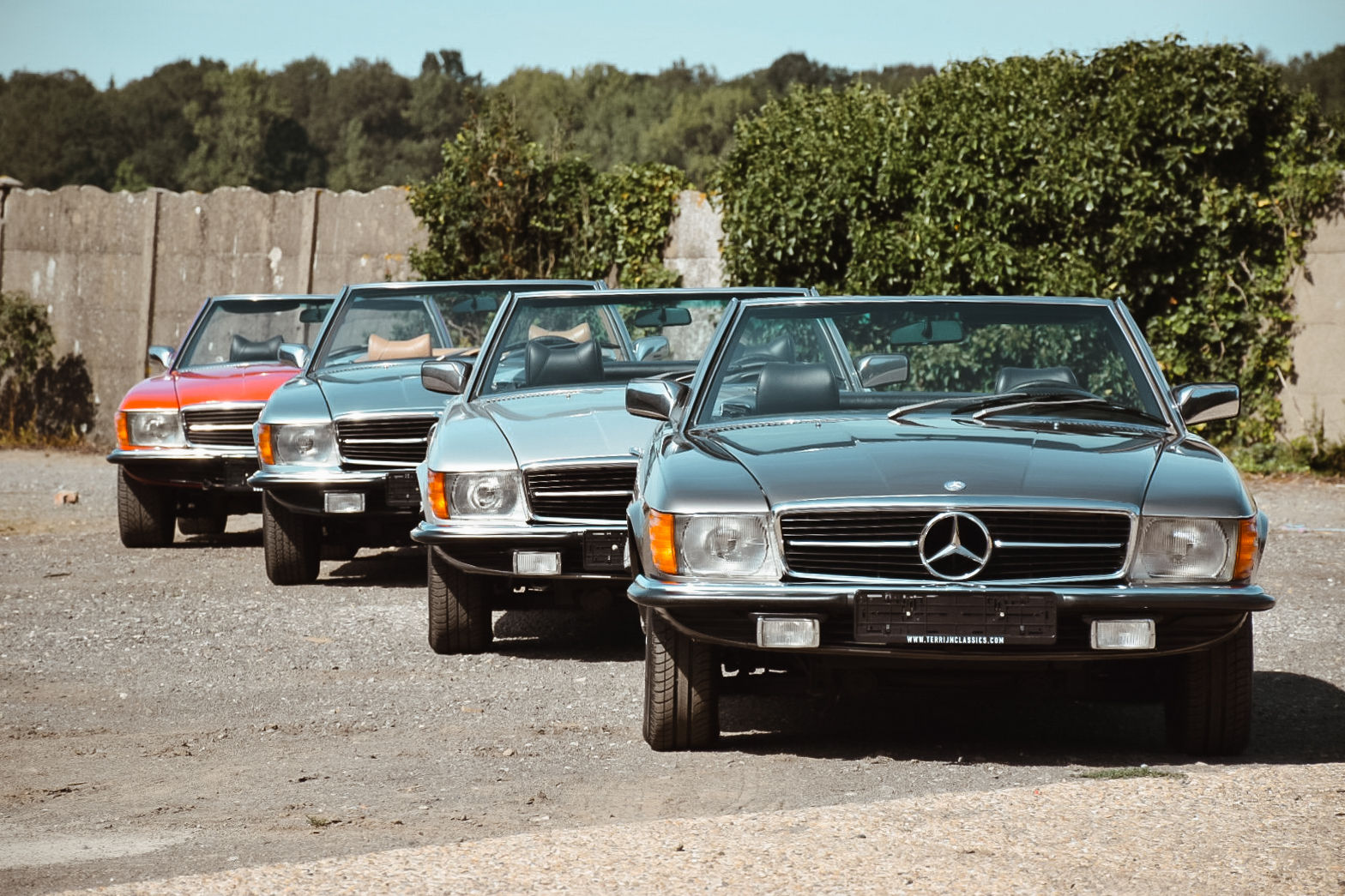Avoid these 5 mistakes when buying a Mercedes-Benz classic car
As a Mercedes-Benz classic car specialist, we have extensive experience with the typical issues enthusiasts face during or after buying a classic Mercedes. The mistakes below are not specific to one model. They’re just as relevant if you’re looking to buy a Mercedes SL classic as they are for other Mercedes-Benz classics. Read on to avoid frustration, hassle and unexpected costs.
1. Misjudging the technical condition
2. No budget set aside for post-purchase repairs
3. Choosing the wrong car for your goals and budget
4. Not accounting for annual maintenance costs
5. Blindly trusting the wrong seller
1. Misjudging the technical condition
The condition of Mercedes oldtimers can vary greatly. Without the right experience, it’s difficult to make an accurate assessment. Even experienced mechanics often provide only a surface-level evaluation, unless they have specific, hands-on experience with both working on and purchasing Mercedes classics.
In theory, we could also assess other brands like Porsche or BMW. But we choose not to. Our focus is solely on Mercedes oldtimers, because only there we have the depth of knowledge and practical expertise to offer a truly reliable, detailed evaluation. For other brands, we can perhaps confirm whether the structural foundation is sound or whether significant work is needed. But assessing true value or originality of key components is too specific and best left to experts in those marques.
Our advice: get support from someone who knows what they’re doing. The cost of expert guidance is minor compared to the potential losses from a poor purchase. Ideally, work with a Mercedes oldtimer specialist who knows the model you’re considering. If that’s not possible, a knowledgeable classic car mechanic or an appraiser with oldtimer experience can also provide valuable insight.
2. No budget set aside for post-purchase repairs
Almost every oldtimer requires catch-up repairs after purchase. Think of worn suspension, aged hoses, malfunctioning systems or hidden risks of breakdown. How much budget you’ll need depends on the condition of the vehicle and how thoroughly you want to bring it up to standard. Would you like an estimate? Feel free to contact us to inspect the car together.
Sometimes, sellers genuinely believe their car is “completely sorted.” In many cases, this is due to a lack of knowledge and experience with Mercedes-Benz classic models. This applies to both private sellers and general garages that work on all brands.
There are two exceptions where post-purchase repair costs are usually not necessary:
You buy a Mercedes-Benz classic from an honest and reliable specialist who knows the model inside and out, and provides a proper warranty.
The car has recently undergone a thorough service by a specialist in classic Mercedes models. Not just a basic oil change, but a full round of deferred maintenance and repairs.
3. Choosing the wrong car for your goals and budget
The biggest pitfall is buying a car at the very bottom of the price range. If the model you’re interested in typically sells for between €10.000 and €70.000, it can be tempting to buy a running Mercedes oldtimer for €20.000. But in practice, that’s often the worst mistake you can make, because the real costs always come later. If the car’s foundation is too weak, it’s usually the wrong vehicle to invest in long term. You’ll spend a lot of money without ever truly bringing it up to standard or maintaining its value.
Financially, it’s often wiser to choose a slightly less expensive Mercedes model, so you can afford a well-maintained example within your budget. There’s a reason people say: “Nothing is more expensive than a cheap Mercedes oldtimer.” It’s the same logic as trying to buy a luxury villa with the budget of a modest townhouse, you know it’ll come with major hidden costs.
Many buyers have one dream model in mind, without really knowing the full Mercedes-Benz classic range. In reality, there are often models that better match your goals and your budget than the one you originally had in mind. For example, people often think first of the iconic 190 SL or the Mercedes Pagode. But if your budget isn’t high enough for a quality example, it’s often a much better idea to go for a perfect Mercedes R107 instead.
Want to explore the options? Take a look at our Mercedes-Benz classic model guide with photos and price indications.
4. Not accounting for annual maintenance costs
Any classic car that hasn’t been fully restored still contains original, and therefore aged, parts and systems. These require more maintenance and are more prone to wear. This applies to all brands, including Mercedes-Benz oldtimers.
Fortunately, a Mercedes-Benz classic is known for its thoughtful engineering and high build quality. These cars were built to last and are technically very solid. But they are still luxury vehicles from the upper segment, equipped with larger engines, complex systems, and high-end components. Mercedes intentionally chose more advanced (and more expensive) solutions at the time, simply because they made the car better. You can still feel that philosophy today: these cars drive remarkably well for their age. But that also means that maintenance tends to be more costly.
It’s no different with modern cars: a shock absorber for a Volkswagen Polo costs a tenth of what one costs for an S-Class. And yet, some people buying a Mercedes SL oldtimer underestimate that it came from that same luxury class, with the maintenance costs that come with it.
So it’s important to set a realistic annual maintenance budget. Want a more specific estimate? Feel free to contact us.
5. Blindly trusting the wrong seller
Unfortunately, we still often see people buying a Mercedes oldtimer that’s said to be “in perfect condition,” while in reality there’s a lot of work to be done. Many sellers are honest and have good intentions, but unfortunately, that’s not always the case. Some dealers buy and sell cars without really understanding their technical condition.
If you buy a car like that with a solid base and just some deferred maintenance, it’s usually manageable. But we also see Mercedes classics come in that the new owner simply should never have bought. In those cases, all we can do is deliver the unfortunate news.
Do you have questions about how to approach the purchase of a Mercedes oldtimer, or would you like professional help with your decision? Be sure to check out our purchase advice.



